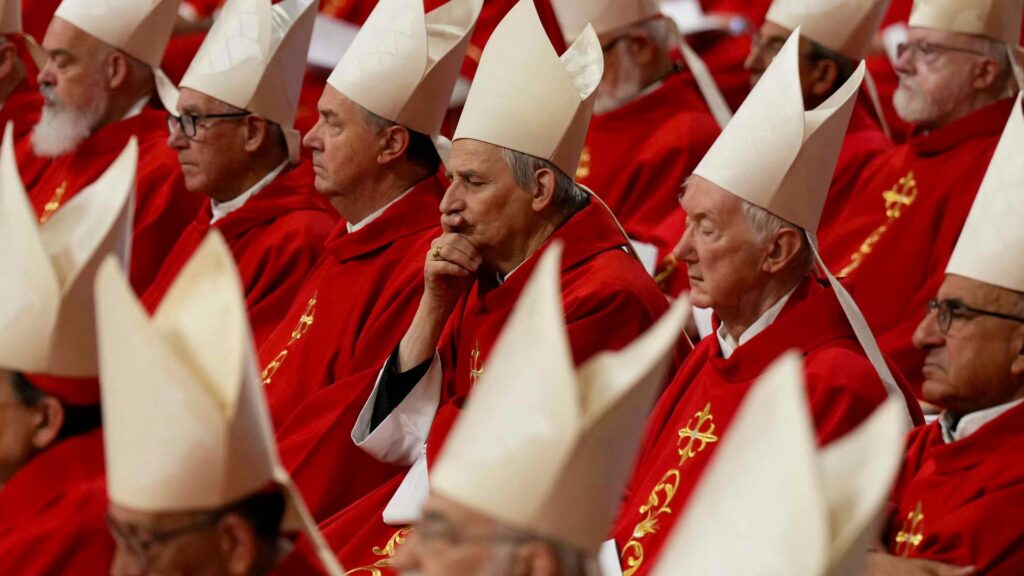On Wednesday morning, 133 cardinals will file into the Sistine Chapel to cast their votes for the next leader of the Catholic church.
Pope Francis was laid to rest on April 26. Since then, the College of Cardinals has been meeting in what is known as general congregations. It’s a chance for them meet each other, to lobby for their picks and discuss what direction they feel the church needs to go in.
“Some of them, they don’t really know each other very well,” Grant Kaplan, a professor of theology at St. Louis University, said. “I imagine the cardinal from Australia might have never met a lot of the other people there, and so they get to know one another a little bit.”
While 135 cardinals are eligible to vote in the conclave, two have said they cannot attend for health reasons, the Associated Press reported.
The choice for the next pope is not as cut and dry as one might think, Kaplan noted.
Once cardinals walk through the doors of the Sistine Chapel, they are cut off from the outside world. This means no technology.
“They’re trying as much as possible to preserve the integrity of the process,” Kaplan said.
That doesn’t keep politicians from lobbying before the conclave.
Former Gov. Mario Cuomo of New York tried to influence some of the cardinals in a past conclave by making a pitch for Cardinal Timothy Dolan, who was archbishop of New York.
“This was just seen as having a very negative effect, because Italian politics are not the same as American politics,” Kaplan said. “Someone from the outside lobbying is just like a death knell in a certain sense.”
With Cuomo as governor at the time, his wish for Dolan as pope was more about New York than the Vatican. However, that’s not the only reason Dolan, or for that matter, any other American, has a hard time being elevated to the church’s highest office.
“The American church, even though America is a large country, it is small in terms of number of Catholics compared to other countries,” Kaplan said. “There are 10 cardinals who have American citizenship, who will be voting, so it’s not a tiny block. But if you think in general of American influence in the world, to have 10 out of 130-something is not a power block.”
Kaplan said there’s a better chance the next pope could be Italian.
“On a numbers game, it would seem like Italians would be favored,” Kaplan said. “Italian is also the language that people communicate in, the common language, and that I assume, would give Italians a leg up.”
Claire Giangravè, a Vatican correspondent for Religion News Service, agreed.
“One has to consider Cardinal Matteo Zuppi. He is not only the head of the Italian bishops and has that weight behind him, but he has also been chosen and tapped personally by Pope Francis to bring his message of peace in Ukraine,” Giangravè said.
However, with 72% of catholics non-European or non-North American, the cardinals may go with a choice more representative of the majority.
Kaplan said Cardinal Luis Antonio Tagle might be the best option. Tagle’s mother is Chinese and Filipino.
“He is sometimes called the Asian Pope Francis,” Kaplan said. “Would be curious to see whether he’ll be considered, in part because Asia is a pretty big part of the world, and the Philippines is a very strong catholic country, but it’s one where there have been some tensions with Muslims.”
Keeping the majority is key when so many are leaving the church.
In America, a Pew Research study shows for every 100 people who join the Catholic church, 840 leave.
“Finding a way to make the church attractive to people, or make the message of Christianity attractive to people who’d never heard it or never been exposed to it before, is one thing, but also people who, for whatever reason, were raised Catholic, but at some point stopped going and never thought of going back,” Kaplan said.
Should the conclave seek a more conservative pope, Giangravè points to the archbishop of Budapest, Cardinal Péter Erdő.
“He is loyal to the tradition of the church, but at the same time he’s been sort of media shy, avoiding controversy while maintaining a very good relationship with Pope Francis and the Vatican,” Giangravè said.
No matter who is chosen, the next pontiff must be an exceptional communicator, Kaplan said.
“I would encourage people who are nervous about this just to to be patient,” Kaplan said.
“If you are a person of faith, think that somehow God” and not just the cardinals played a role in the selection of the pope, Kaplan said.
“Maybe a little bit of humility or a wait-and-see attitude would help,” he said.


